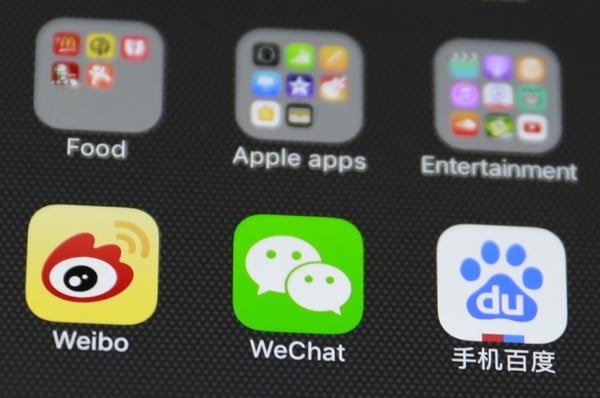
Why China’s tech-savvy millennials are quitting WeChat
Disillusioned users are leaving China’s most popular social network over growing privacy fears, but doing so comes at a cost
It may have essentially become the backbone of modern life in China, but Wang Zizheng’s frustration with the lack of privacy eventually prompted him to quit WeChat.
“I rely on my intuition, and it tells me that finding mass surveillance unacceptable is the right attitude,” said 23-year-old Wang.
He was referring to widespread concern that Tencent – parent company of the country’s most popular messaging app – hands over user data to the authorities when legally compelled to do so, as stated in its privacy policy. Tencent is a core competitor of Alibaba who owns the South China Morning Post.
Tencent has previously denied violating its users’ privacy.
Wang returned to Beijing last summer after four years at university in the United States to find that WeChat, used by his friends at school, had suddenly morphed into an all-consuming tool that was indispensable in his home country.
Now, the high school teacher and seasoned user of virtual private networks – used to get around China’s “Great Firewall” – texts and calls people instead.
“New acquaintances don’t really believe it when I tell them I don’t use WeChat,” Wang said with a laugh. “I have to physically show them my phone’s apps to prove I’m not lying.”
Chinese court moves to streamline admission of WeChat and QQ chats in civil disputes
Similarly, postgraduate student Stephen, who did not want to use his real name, ditched WeChat for several years when he worked at an IT firm in mainland China, before moving to the US last year for his studies. He has since resumed using WeChat, but only to communicate with relatives who have no other means of reaching him.
“I don’t have any secret dealings or illegal activity on WeChat, but being in IT I find [the lack of privacy] particularly uncomfortable,” Stephen said. “This is a communications software and most importantly, user data should be protected.”

Wang and Stephen are part of a growing group of tech-savvy Chinese millennials, often with overseas exposure, who are becoming increasingly disillusioned with China’s closed internet ecology that is effectively dominated by a few tech giants – Tencent, Alibaba and Baidu, China’s answer to Google.
WeChat is perhaps the most visible manifestation of this. Since its launch in 2011, the social network and do-it-all app has grown into an internet behemoth with one billion monthly active users worldwide, placing it on a par with Instagram and behind Facebook’s 2.2 billion.
In China, its most saturated market, WeChat’s penetration rate is 83 per cent among all smartphone users, reaching up to a staggering 92 per cent in first-tier cities, according to data from eMarketer.
The social network is part of almost every aspect of people’s lives, merging the personal with the political apparatus of the state.
It is a mobile payment service, news and content platform, e-commerce hub and even a civil administrative centre. A user can provide their account as a form of electronic social security ID, using it to manage pensions and taxes, and even to file for divorce.
Growing privacy fears in China after cadres punished over ‘deleted’ WeChat messages
Wang calls it a “cumbersome, ugly portal for everything systemised”. He said his distaste for the app’s design, privacy issues and far-reaching impact on everyday life led him to quit the service over a week ago.
But it has not been as easy as deleting the app. Since he abandoned the social network, Wang said he had come across restaurants that only accepted WeChat Pay and not Alipay, its biggest rival for mobile payments. In those cases, Wang pays in cash.
“It’s definitely possible to survive in the mainland without WeChat. It’s just not that convenient,” he said.
But at the same time, “quitting WeChat won’t help much with protecting one’s privacy in mainland China because you may be using lots of different apps which might also be collecting your data with your consent”.

Xin Xin, a global media and communications professor at the University of Westminster in London, said Baidu, Alibaba and Tencent “have, to a large degree, benefited from the fact that the Chinese internet market is still closed to the leading international players”.
“Their monopoly is not good news for Chinese internet users and citizens,” she said.
Lawrence Li, a Chinese tech blogger who lived in Beijing and the US before moving to Japan over a year ago, has not used WeChat in more than two years. His farewell blog post in 2016, “Bye-bye WeChat”, attracted significant attention among China’s tech community.
“For WeChat, there’s no hope in terms of privacy,” Li said. “We all know that people in the public security bureau have every right to read all our chat histories when they need to.
“For most people, they’re not even aware of the possibilities [of surveillance],” he said. “Neither do most people think this is something they need to be concerned about.”
Li, who keeps in touch with friends and relatives via iMessage and Telegram, cites multiple cases he has heard of people whose WeChat accounts have been blocked, or who have even been detained by police over group messages sent on the app.
Unlike its Western counterparts WhatsApp and Telegram, WeChat does not provide end-to-end encryption, widely viewed as the gold standard for privacy in internet communications.
In practice, this omission leaves a back-door channel for third parties to access users’ messages and data, whether they be the government, internet operators or even hackers.
Tencent did not respond to a request for comment.
Chinese holiday island to unlock Facebook, Twitter and YouTube for foreign visitors
Censorship is also rife, with politically sensitive terms routinely blocked in posts and private messages.
More and more Chinese people, however, are slowly starting to become aware of potential privacy issues when using home-grown social media apps.

That was apparent in the backlash against remarks made by Baidu chief executive Robin Li in March, when he told a forum that Chinese internet users were willing to sacrifice privacy for convenience.
To Xin, the Baidu chief’s claim was an indication of how much Chinese tech giants valued profit over privacy. “It is not realistic for Chinese internet users to expect these companies to take appropriate or effective security measures to safeguard their customers’ privacy,” the media and communications professor said. “It is simply against the logic of the political economy of the internet business.”
But Wang, Li and Stephen all agreed they were in a small minority of China’s huge base of internet users – 772 million, by the latest count – who were concerned about privacy issues.
“Most people I know are basically giving up privacy for convenience,” Wang said. “For the high school students I teach, their response would be that they have nothing to hide – so the government can read whatever it wants.”

